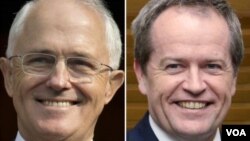ຊາວອອສເຕເຣຍກຳລັງພາກັນໄປປ່ອນບັດເປັນຈຳນວນຫລວງຫລາຍ ໃນການເລືອກຕັ້ງຂອງລັດຖະບານກາງທີ່ມີຄະແນນສຽງໃກ້ຄຽງກັນ ບ່ອນທີ່ປະເທດດັ່ງ ກ່າວກຳລັງຕັດສິນໃຈວ່າ ບັນດາພັກສຽງສ່ວນນ້ອຍ ຈະສາມາດໂຄ່ນລົ້ມລັດຖະ ບານຊຸດປັດຈຸບັນໄດ້ຫລືບໍ່.
ໃນຂະນະທີ່ການປ່ຽແປງຂອງດິນຟ້າອາກາດ ຄົນເຂົ້າເມືອງ ແລະການສຶກສາເປັນເລື້ອງທີ່ສຳຄັນ ແຕ່ມັນແມ່ນເລື້ອງເສດຖະກິດມີທ່າທາງວ່າ ຈະເປັນຜູ້ຕັດສິນຊີ້ຂາດວ່າພັກໃດຈະ ເປັນຜູ້ໄດ້ຮັບໄຊຊະນະ.
ການຕັດສິນໃຈຂອງອັງກິດຖອນໂຕອອກຈາກສະຫະພາບຢູໂຣບ ໄດ້ກໍ່ເກີດມີຄວາມຢ້ານກົວຢ່າງໃຫຍ່ຢູ່ໃນອອສເຕຣເລຍ ແລະບັນດາຜູ້ນຳການເມືອງໄດ້ ເນັ້ນໜັກເລື້ອງຄວາມໝັ້ນຄົງດ້ານເສດຖະກິດ ເປັນຫົວໃຈໃນການໂຄສະນາຫາສຽງຂອງພວກເຂົາເຈົ້າ.
ນາຍົກລັດຖະມົນຕີ Malcolm Turnbull ໄດ້ກ່າວຕໍ່ບັນດາຜູ້ມີສິດປ່ອນບັດວ່າ ປະເທດຊາດຕ້ອງການສະຖຽນລະພາບ ທີ່ລັດຖະບານປະສົມເປັນກາງອຽງຂວາຂອງທ່ານສາມາດ ສະໜອງຕອບໄດ້.
ແຕ່ວ່າຜູ້ນຳຝ່າຍຄ້ານຂອງພັກແຮງງານ ທ່ານ Bill Shorten ໄດ້ກ່າວຕໍ່ບັນດາຜູ້ມີສິດ ປ່ອນບັດວ່າ ນາຍົກລັດຖະມົນຕີເປັນຜູ້ນຳທີ່ອ່ອນແອ ຄືກັນກັບຄູ່ຕຳແໜ່ງ ຝ່າຍອັງກິດ ທີ່ໄດ້ລາອອກໄປນັ້ນ.
ການເລືອກຕັ້ງຄັ້ງນີ້ໄດ້ເປັນທີ່ສັ່ນສະເທືອນຍ້ອນພັກນ້ອຍໆຈຳນວນນຶ່ງ ຮວມທັງຜູ້ສະໝັກຈາກພັກສີຂຽວຫຼືພັກ Greens ແລະບັນດາພັກອິດສະຫຼະອຶ່ນໆທີ່ຕັ້ງຊື່ ຕາມຜູ້ສະໝັກ. ແຕ່ພັກເຫລົ່ານີ້ທັງໝົດຕ້ອງໃຫ້ຄວາມເຊື່ອໝັ້ນແກ່ຜູ້ມີສິດບັດວ່າ ເຂົາເຈົ້າຢູ່ໃນກຳມືປອດໄພຕາມທີ່ເສດຖະກິດຕ້ອງການ.
ການປ່ອນບັດລົງຄະແນນຢູ່ໃນອອສເຕຣເລຍເປັນການບັງຄັບ ເພາະສະນັ້ນຈຶ່ງມີຜູ້ຄົນ ອອກໄປປ່ອນບັດເປັນຈຳນວນຫລວງຫລາຍ ແລະດັ່ງດຽວກັນເດີມພັນກໍ ສູງດ້ວຍ.
ການຢັ່ງສຽງສະແດງໃຫ້ເຫັນວ່າ ທັງສອງພັກໃຫຍ່ ແມ່ນມີຄະແນນສຽງໃກ້ຄຽງກັນ ໃນຂະນະທີ່ການໂຄສະນາຫາສຽງມາເປັນເວລາແປດອາທິດ ໄດ້ສິ້ນສຸດລົງດ້ວຍການປ່ອນບັດໃນມື້ວັນເສົາມື້ນີ້.
Australians voted in large numbers Saturday in a close federal election where the country is deciding whether minor parties will overthrow the incumbent government.
While climate change, immigration and education are key issues, it is the economy that is likely to decide who wins.
Britain's decision to leave the European Union has created great anxiety in Australia, and political leaders have put economic security at the heart of their election campaigns.
Prime Minister Malcolm Turnbull has told voters the country needs the stability his center-right coalition government can provide.
But opposition Labor leader Bill Shorten says the prime minister is a weak leader, just like his besieged British counterpart.
This election has been shaken by a number of minor parties, including a candidate from the Greens and other independent parties named after their candidates. But all of them must convince voters they have the safe hands the economy needs.
Voting in Australia is compulsory, so turnout is high, and so are the stakes.
Opinion polls had both major parties neck-and-neck as eight weeks of campaigning comes to an end with Saturday's election.





